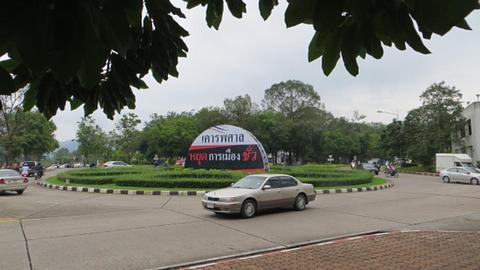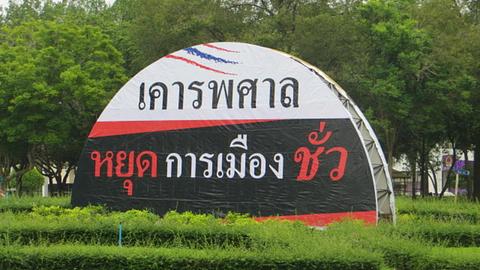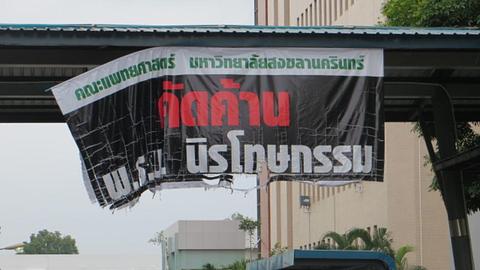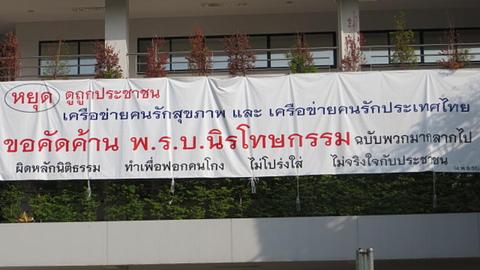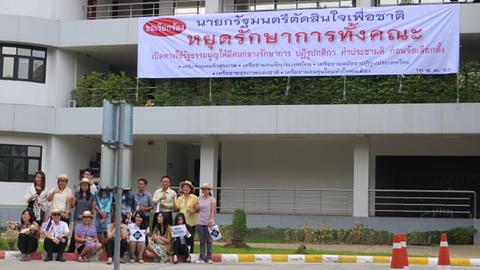Stop promoting pseudo –Democracy
This following article may help to brighten and broaden the LACK OF knowledge of the mentioned French/IMF economist and the western media.
Ms. Tarisa Watanagase, former Governor of the Bank of Thailand.
"Stop promoting pseudo -Democracy.......We need the real democratic countries condemn such Pseudo-democratic government
The latest bout of nation-wide protests has erupted in Thailand, this time in opposition of the highly controversial Amnesty bill. The bill was originally proposed by the government to “heal the political divide” by granting a blanket amnesty to non-leader participants in the numerous rallies and political protests since the military coup in 2006 which ousted Thaksin, the brother of the current prime minister. The bill was substantially expanded in its second reading to pardon the leaders and those involved in the 2010 riots, in which pro-Thaksin supporters torched government buildings and major department stores. The riots subsequently led to clashes with authorities, resulting in over 90 deaths, many with bullet wounds from sources that have yet to be identified. Furthermore, the bill would extend to cover all corruption cases brought up in the aftermath of the coup, including those against Thaksin. But perhaps most shocking is the bill’s extension to 2004, two years before the coup, when the Thaksin regime brutally cracked down on a group of protestors in Tak Bai, southern Thailand. Police allegedly fired into the crowd, killing seven; the remaining were arrested and piled horizontally onto trucks for a long drive to a military camp, during which 78 detainees died of suffocation. If the current government cites the unconstitutional nature of the coup as evidence for the illegitimacy of the corruption charges issued in its aftermath, on what grounds would amnesty be justifiable for such a crackdown which took place under a democratically elected government?
Thailand is no stranger to corruption and political exploitations. Respondents in a June 2013 survey estimated that 30-35% of government and state-enterprise project funding are lost to corruption, mostly into the hefty pockets of politicians. Transparency International’s Corruption Index ranked Thailand at 88 out of 176 countries in 2012, with a score of 37 out of 100. But the audacity and brazenness of this bill are unprecedented. If passed, it would compromise the already weak moral institutions of the country in a blatant message that crime can go unpunished. How could the parliament push and vote for a bill that deviates substantially from the principles adopted in its first reading, violates the principles of human rights, overrides the verdict of the court, and promotes immoral and fraudulent behaviors despite wide-spread protests? It is all under the guise of “Democracy”. With its absolute majority in the parliament, the ruling party claims it has the mandate of the majority of the population and therefore has the right to proceed. With parliamentary checks and balances out of order, protestors have taken to the streets in the hope that their voices may be heard by the Senate, that it may reject the bill.
The U.S. and the world have recently witnessed the government shutdown and debt ceiling saga with frustration. This is a vivid example of how even the world’s most advanced democracy can be flawed. In this case however, one can reasonably expect U.S. voters to vent their anger in the next election. Unfortunately for Thailand, where political problems are deeply rooted in its economic, educational and societal divides between the urban rich and the rural poor, problems cannot be solved with a simple spoonful of democracy to lead to a change for the better in the next election. When the first priority of the rural poor is to put food on the table, political interests and the sustainable future of the country become secondary. Votes can be easily played into the hand of politicians with questionable moral standards and conscience. Simply holding elections does not guarantee a democratic outcome. This is a common outlook in the West on the political situation in developing countries: that democratically elected governments represent the will of the people and are therefore legitimate. Objectively speaking, democracy is a long-term goal; the immediate concerns are reducing the inequality on all fronts as this is a prerequisite for a resilient and better functioning democracy. In the meantime, peaceful protests which raise political awareness, and even the occasional bloodless coup in the past, have been part of the growing up process toward a more genuine democracy. Blindly supporting an elected regime and condemning any action against it as undemocratic will only promote pseudo-democracy.
Tarisa Watanagase"
บันทึกนี้เขียนที่ GotoKnow โดย Prof. Vicharn Panich





